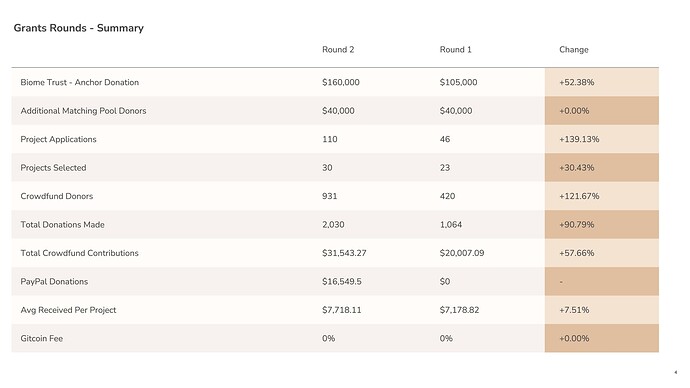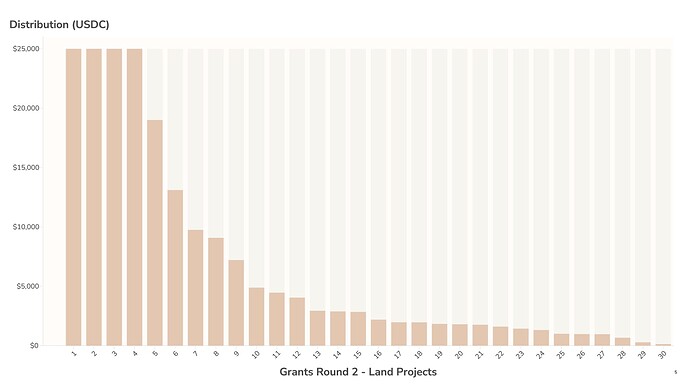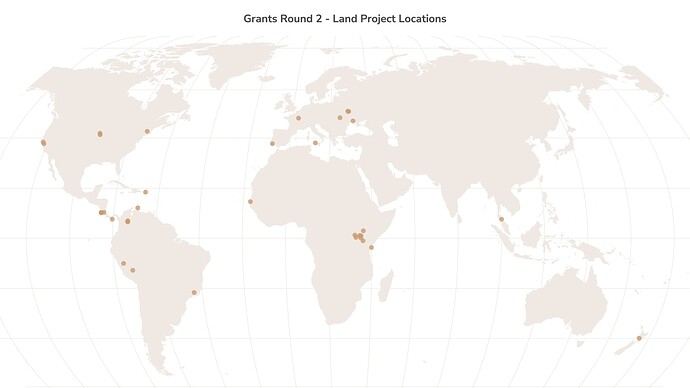Thank you Gitcoin for enabling us to host our second Ma Earth Grants Round, to support regenerative land and ocean projects in #GG22. We’d also like to acknowledge @MathildaDV @umarkhaneth @wasabi and @jon-spark-eco who were responsive to our questions and needs while operating the round.
Overall, things went smoothly. We raised over $30,000 in crowdfunding from 931 donors, in addition to the $200k matching pool provided by Biome Trust, Naia Trust, and Gitcoin. All of these funds were distributed to 30 regenerative projects, carefully selected by our panel from an initial set of 110 applications.
You can see our round recap here, and Gitcoin report card here.
The most significant difference from our first round was the addition of PayPal, hosted by ViaPrize. This introduced several new considerations around messaging, analytics, round finalization, and funds distribution. Thanks to @noahchonlee for providing customer support at each step.
We received a lot of positive feedback about the PayPal option, especially from projects whose communities are largely not engaged in web3. After the round was finalized, there were some concerns expressed that PayPal’s availability may disadvantage projects in certain geographies, or skew the results unfairly for other reasons.
We used Quadratic Funding with Passport’s Model-Based Detection, but we did not use Connection-Oriented Cluster Matching (COCM) this time. We felt that COCM skewed results too unfavorably for projects newer to Gitcoin or web3. This might have been related to the addition of PayPal, but it was hard to tell from the available data.
There was a greater variance in the final matching amounts than our first round, with four projects achieving the maximum cap. To ensure all projects receive enough funds to warrant their engagement, we’d likely implement a “minimum” distribution amount in the future. A nice-to-have feature in Grants Manager would be a minimum field (like the maximum one) that took care of these calculations automatically.
We recognize Gitcoin is providing their platform at no cost. In considering future business models, as a round operator, we would have felt good about paying a 2-3% fee on the GMV of this round. I could also imagine this percentage being higher as the feature sets evolve.
In reflecting on the QF experience more broadly, we are left thinking about this post shared by Will Ruddick from Grassroots Economics: Insights from E.O. Wilson's Legacy.
The team at Grassroots Economics generously regranted $10k of their proceeds from the Ma Earth Grants Round to a Landscape Regenerators pool on Sarafu, using Commitment Pooling with blockchain functionality. This is another example of a ‘regenerative finance’ experiment we are excited to be part of.
We witnessed participants in our round actively onboarding other projects into Gitcoin. For example, GainForest supported communities in their “Road to Gitcoin” program. AgroforestDAO facilitated workshops to help agroforestry projects apply for the Ma Earth round. New network connections are also being made around tooling, impact tracking, bioregionalism, and more.
We recorded several conversations at Devcon around web3 grants programs, including with Owocki, ReFiDAO, Celo Public Goods, Grassroots Economics, Metrics Garden, and Octant. Those will be posted on YouTube and our website soon, as part of our series The Regeneration Will Be Funded.
Your additional feedback and suggestions are welcome.
Thanks again,
Matthew & Ma Earth team


